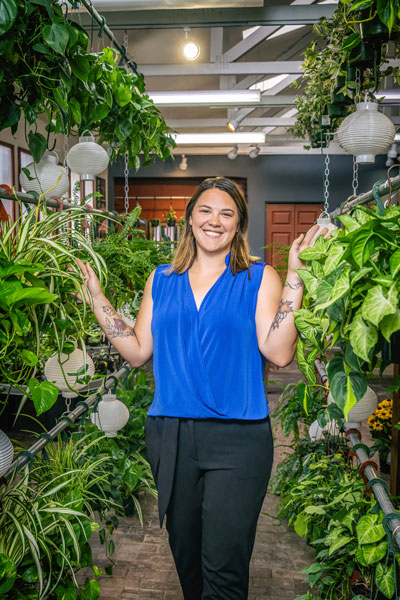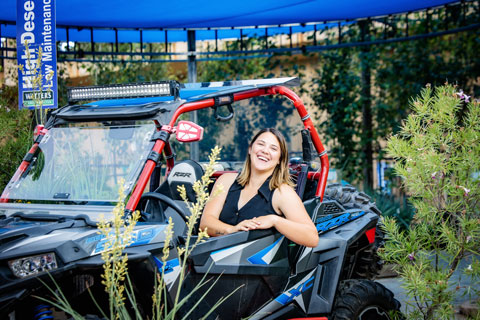9/1/2024
Making Connections
Jennifer Polanz

Growing up in the family business at Watters Garden Center in Prescott, Arizona, McKenzie Lain, now 28, had an idea of the impact the store had on the local community. But it wasn’t until much later that she realized just how much of an impact it had.
“I think there was a sense of that because of who my dad is. He was everywhere,” she said of her dad, Ken Lain. “So everyone knew him. I wasn’t super aware until later on of how important or what we were in the community. But I knew that we were kind of a big thing.”
It hit her later, though, when customers would tell her of the joy they felt walking into the 2-acre, third-generation family-run store. They would use words like “meditation spot” and “enjoyment” to her.
“I know that a lot more now because people would always mention it. And we’re the one place in town you can do that with. There’s not a botanical garden or a huge place you could go to, so it’s who we are.”
McKenzie’s Journey Back to the Business
Like many kids who grew up in a garden retail environment, she worked at the store, but also did the usual kid things—sports and band, for example. She saw her parents traveling and wanted to explore bigger places than the—at the time—smaller town of Prescott. After graduation, she headed to California for college and a degree in psychology. Why? She wanted to do something with the body and eventually settled on the mind. After college, she went to a seminary school in Pasadena for a master’s degree in Marriage and Family Counseling to further help kids and families.
If you’re thinking at this point these aren’t the usual bona fides of a traditional garden retailer, you’d be right. But, it does help (and we’ll get to that in a bit). And like many stories of someone in this generation, COVID played a big part in how her life unfolded. She graduated in 2021, having to go home to finish her degree during the COVID pandemic—which, in a way, was a blessing in disguise.
McKenzie is one of four kids in the Lain family, none of whom were committed to taking over the business. That led Ken and Lisa Lain to start prepping the business, which was passed down from Lisa’s parents, Harold and Lorna Watters, to Ken and Lisa in the 1990s, for an eventual sale outside the family.
So what changed? I’ll let McKenzie tell you in her own words: “Coming back was like, oh, I like my small town. And then I fell back in love with the business.
“You grow up in it. You lose appreciation for what it was, but leaving and coming back, you remember why. This place is so great, what we do for our community and what we stand for. It was a good reminder of that. So I just fell back in love with it and I was like, ‘I can make this my life and take this on.’”
Making Those Connections
As McKenzie re-engaged with the business and began running more of the store operations, the future began to take shape. It’s still a work in progress, but as they look forward, it’s one in which McKenzie is a big focus, and it’s about growing the business.
“I don’t know what it’s going to look like, but for the next five years or 10 years we’re restructuring what we’re going to look like, trying to build bigger than ourselves,” McKenzie said. “We’ve been a small business, mom-and-pop run, and I think it can become bigger than that.
“Technology has a lot to do with that. Getting the right people in and giving them the power that they need to have to help run it. So we rely less on family, but it’s still family run. And then I’m taking on that larger role of running the garden center fully. Not just as a manager, but just over all of it.”
Going back to that master’s degree and understanding how people communicate helps McKenzie in her role as manager in hiring and on-boarding new employees, too. Making those connections helps to bridge the gap with new hires, people of all generations or even between employees who may be not be seeing eye to eye.
And it’s not just about effective communication, but also ownership, and allowing employees to take on deeper roles to reduce the reliance on one person or just a few people. Instead, the responsibility of running the garden center becomes a team effort. A big part of that is culture, and I asked McKenzie whether they just had a culture or whether they define what the culture is.
“It’s both, so we do define it. We’re a family-run business and we want you to be better than when you started with us. And that either means in the work, in your personal life, in whatever it is,” she said, adding they train and give employees the skills they need to be successful. “And then from there, our culture is more implemented (by employees). Some of my staff that I have year-round who’ve already been in it, they guide and teach my new people.
“We’re very open with who we are, what we do, how we work as a business. We don’t hide anything. I think that helps also show people what we stand for.”
Knowing Your Audience
We talk a lot about understanding your demographics and catering to what your customers want. What’s interesting about Watters is they’re experiencing a different kind of change to their audience than many garden centers. Whereas many retailers are seeing an increase in Gen Z and Millennial shoppers, Prescott is experiencing a population boom of a different kind: Boomers and Gen Xers. It’s very attractive for retirees because of a milder climate than other parts of Arizona and its beautiful vistas. And it’s a big boom—the population in the surrounding area has doubled since 2000.
That’s not to say there aren’t younger families there, but they aren’t the majority, which means the messaging has to reach everyone, particularly the incoming crowd (of all ages) who may not be used to gardening there.
“A big part of it is our classes. We do free classes almost the entire year. We take a break in May and then in the winter,” McKenzie said of how they attract new homeowners. “It’s such a harsh place to learn how to grow. That attracts a lot of new people, especially the edible gardening piece that is becoming big. So I think they’re all coming in for that.”
They also do a ton of outreach and education, from Rotary meetings and young professionals clubs to Ken writing often for local newspapers and magazines, and doing a radio show and podcast. Then there’s video and social media channels to round it out. But it’s not all about gardening, either. They also support local nonprofits as a way to give back and make sure they’re honoring that special place they hold in the community.
 All of their messaging is geared toward the garden center being the place for community and connection, providing knowledgeable employees and understanding the gardening necessities of the area. Particularly when there are multiple box stores competing for those customers.
All of their messaging is geared toward the garden center being the place for community and connection, providing knowledgeable employees and understanding the gardening necessities of the area. Particularly when there are multiple box stores competing for those customers.
“Our store is about our experience and giving the right information because a lot of them sell what doesn’t grow here or they give you wrong information,” she said of the local boxes. “So one of our biggest draws is if you’re struggling, which a lot of people do when they move here, come to us and we’re going to be honest with who we are, what we are, what grows here, what doesn’t. We sell only things that grow here.”
That curation process also helps keep inventory tight because they’re on a small footprint of a little over 2 acres. They have to be selective about what comes in so it can move out quickly.
“We don’t have a space to do everything, so we use Top 10 trees. Here’s Top 10 shrubs. We’ll maybe put in a new selection here and there,” she said. “We have to curate partially for the space we have. But, also, we don’t want to overwhelm people with everything.
“Here’s three. Here’s what they do. Here’s where they are. Really curated to this city.”
Getting to Know McKenzie
I asked her some ... well ... slightly off-the-wall questions to find out more about her. Here’s her responses (thanks for humoring me):
Q: What’s your favorite time of the day/week/month?
ML: I do like May and June because people have it figured out. My staff has it going on. I don’t have to train them anymore as much. So it’s just a little bit easier, and then you’re just having fun moving things around all the time because you’re getting product in everywhere, and customers are everywhere. It keeps you busy, but it keeps it interesting.
Q: What is your favorite spot in the garden center?
ML: I actually like being up in the annual house. You can do a lot of busy work. You can see what’s going on in your garden center, but it’s also kind of isolated.
Q: When you’re not at the store do you have any hobbies you enjoy?
ML: Reading is a big one. (It’s) downtime away from talking … I talk all day long. I also like hiking; Prescott is big on hiking—we’re not hot, so you’re not dying. And just hanging out with my dogs, Finn and Ginny.
A Space to Connect
Watters Garden Center is using the customizable ConnectSpace intranet system designed by Souny and John Kennedy for back-end communication with employees. That way, employees can log on and see work schedules and meetings, make time-off requests, and even get instructions on what to do if it’s slow that day (like pull weeds with a photo of where to do it). It’s a great resource for McKenzie to put information all in one place where everyone can access it from their phones or computers.
It’s also great for training and what’s pretty neat about it is, along with the training manual, there’s training videos involving all three generations—from Harold Watters, Ken Lain and McKenzie. There’s lots of opportunity to expand the functionality, too, as needed.
About Watters Garden Center
Location: Prescott, Arizona
Size: 2 acres
Sales: $4 million
Employees: 25 in season, about half are full time
Top 5 Categories:
1. Hard Goods (soils & fertilizers)
2. Shrubs
3. Annuals
4. Perennials
5. Trees
What They’re Known For: Education and a curated selection of plants that thrive in the difficult desert climate
Website: wattersgardencenter.com